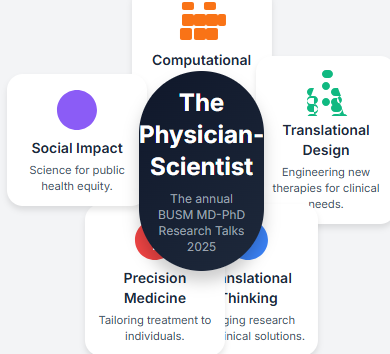Table of Contents
ToggleThe Dual-Role Innovator: A Mission of Purpose
The BUSM MD-PhD Research Talks 2025 offer a crucial look into the physician-scientist career, showcasing how groundbreaking medical research is being used to solve some of the world’s most pressing health challenges.
The Art of Clinical Curiosity
- The MD-PhD Program is designed to train innovators who are driven by clinical curiosity. They bridge the gap between patient care and scientific inquiry, using insights from the bedside to inform their student research and uncover the root causes of disease.
- This unique calling is rooted in translational medicine, where every biological puzzle is seen as an opportunity to not just treat symptoms, but to develop groundbreaking solutions that improve patient outcomes.
The Talks: A Reflection of a Shared Vision
- The annual BUSM MD-PhD research talks are more than a presentation. They are a valuable research showcase.
- Furthermore, this event brings the community together. It’s a forum for strong scientific collaboration.
- Finally, attendees gain vital student insights. This inspires the next generation of innovators.
Your Strategic Guide to a Groundbreaking Career
· This post serves as a strategic guide for navigating the BUSM MD-PhD research talks. It is designed to demonstrate how student research can profoundly shape your career path and provide pioneering insights for your future.
· By examining the insights and mindsets behind five key research areas, this guide enables readers to identify new fields and potential mentors. This provides a strategic opportunity to gain a head start on your professional training.
· Ultimately, this resource is constructed to assist in leveraging the pioneering innovations presented by your peers. It facilitates the transformation of inspiration into a tangible plan for a brilliant career and a defined scientific trajectory.
As Section 1 establishes the unique dual mission of the physician-scientist, the following sections will delve into how these innovators put their skills into practice.
Thinking about a future in research? Discover how to turn your curiosity into a career at studentresearch.net, where innovation and mentorship meet.
The five key skills—computational insight, translational design, translational thinking, precision medicine, and social impact—are explored in the groundbreaking projects featured at the talks.
The Evolving Physician-Scientist Landscape

Physician-scientists use bioinformatics.
- They apply AI and machine learning.
- This helps them analyze large patient datasets.
- It leads to new discoveries.
- Personalized treatment plans are a result.
- This goes beyond traditional lab work.
Translational Design for MD-PhD Research Talks
- This process creates new therapies and devices.
- It engineers novel solutions.
- Solutions address direct clinical problems.
- It highlights the bench-to-bedside bridge.
- Researchers create impactful medical technologies.
- Consequently, patient care is transformed.
Translational Thinking for MD-PhD Research Talks
- This is a unique scientific mindset.
- It identifies unmet clinical needs.
- Furthermore, it formulates a research question.
- It emphasizes a unique perspective.
- This allows seeing both problem and solution.
- This is a core competency for modern researchers. To learn more about this perspective, see the AAMC website.
Precision Medicine for MD-PhD Research Talks
- This involves leveraging genomic data.
- Patient-specific molecular data is used.
- The goal is to customize medical care.
- It moves past a “one-size-fits-all” approach.
- This results in more effective treatments.
- Consequently, targeted therapies are developed. For further information, the NIH website offers a great overview of MD-PhD training.
Social Impact
- This is a broader responsibility.
- It addresses health disparities.
- It promotes health equity.
- Scientific advancements should be accessible.
- This benefits all communities.
- It is a key ethical consideration. For a quick look into the training, watch this YouTube video.
The Art of Translational Thinking
These diverse competencies—from computational insight and translational design to precision medicine and social impact—are all unified by the core principle of translational thinking, which we will now explore in depth.
From Clinical Observation to Hypothesis
- A physician-scientist observes an unmet medical need.
- They turn this clinical question into a testable research hypothesis.
- This process is the initial spark for biomedical innovation.
- To see a lecture on this topic, refer to this YouTube video.
Bridging the Lab and the Clinic
- This is a dynamic, two-way exchange between the lab and the clinic.
- Findings from bench science inform clinical trials, and patient feedback drives new research questions.
- This iterative process ensures research is clinically relevant and leads to effective therapies.
- This YouTube video provides further insight.
This collaboration and unique approach to problem-solving leads naturally to the final piece of the puzzle: an understanding of one’s personal path and vision for the future.
Your Path Forward
· The physician-scientist is a necessary figure in modern medicine, embodying a crucial blend of clinical empathy and scientific rigor.
· This unique role is vital for addressing complex health challenges and ensuring that scientific advancements are grounded in real-world patient needs.
· The reader is encouraged to apply their own curiosity and passion for learning to their research journey, as it is this unique combination of skills that will allow them to make a meaningful impact on the future of healthcare.
Looking for academic help with essays, research papers, or presentations? Get guidance for all types of academic tasks at studentresearch.net.